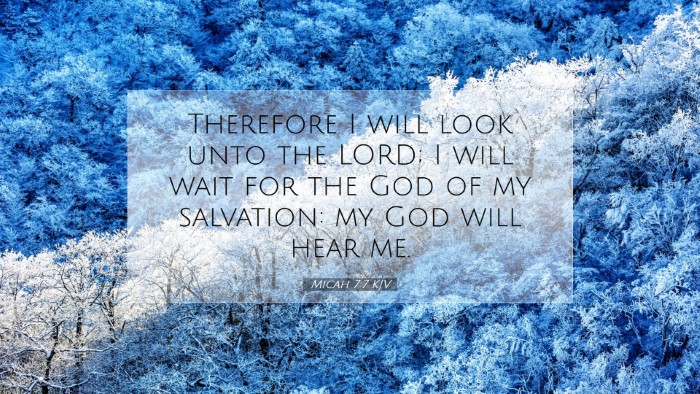Old Testament
Genesis Exodus Leviticus Numbers Deuteronomy Joshua Judges Ruth 1 Samuel 2 Samuel 1 Kings 2 Kings 1 Chronicles 2 Chronicles Ezra Nehemiah Esther Job Psalms Proverbs Ecclesiastes Song of Solomon Isaiah Jeremiah Lamentations Ezekiel Daniel Hosea Joel Amos Obadiah Jonah Micah Nahum Habakkuk Zephaniah Haggai Zechariah MalachiMicah 7:7
Micah 7:7 KJV
Therefore I will look unto the LORD; I will wait for the God of my salvation: my God will hear me.
Micah 7:7 Bible Commentary
Commentary on Micah 7:7
Verse: Micah 7:7 - "But as for me, I look to the LORD; I wait for the God of my salvation; my God will hear me."
Overview
This verse encapsulates Micah's expression of personal hope and faith in God amidst a backdrop of societal disillusionment and moral decay. In a time of turmoil and distress, Micah resolves to focus on the Lord, emphasizing the contrast between the hopelessness of his surroundings and the hope found in God. The commentary draws on insights from well-respected biblical scholars to probe deeper into the theological implications of this statement.
Contextual Background
Historical Context: Micah prophesied during a period of intense social injustice, corrupt leadership, and idolatry in Israel and Judah. His prophecies were directed toward both the misdeeds of the people and the promise of God's eventual restoration.
Key Themes and Insights
- The Contrast of Despair and Hope:
Micah's lamentation is profound; the verses preceding 7:7 depict the spiritual decay of the people, leading to pervasive despair. However, his declaration to "look to the LORD" serves as a pivot from despair to anticipation, indicating a steadfast faith that counters external circumstances.
- Personal Faith amidst Collective Apostasy:
Both Albert Barnes and Matthew Henry emphasize the necessity of individual faith in God during collective wrongdoing or societal failure. Micah, as one among many, still places trust in the divine amidst distractions and discouragement from those around him.
- Waiting on the Lord:
The phrase "I wait for the God of my salvation" underscores a posture of expectation and patience. Adam Clarke notes that this waiting is not passive but an active trust that God will act on behalf of His people. Such patience signifies an understanding of God’s timing and sovereignty.
- Assurance of Divine Response:
Micah's assertion that "my God will hear me" reveals an intimate relationship with the Lord. This personal assurance contrasts starkly with the idle gods of the surrounding nations. The confidence in divine communication assures believers that prayers are not in vain, echoing themes found in the writings of Henry and Clarke regarding the nature of God as attentive and responsive.
- Theological Implication of Salvation:
The term "salvation" in this context goes beyond mere physical deliverance; it signifies a holistic restoration and spiritual well-being. This comprehensive understanding of salvation, as expounded by various commentators, reflects the character of God as a Savior not just in earthly matters but in eternal ones.
Practical Applications
Micah 7:7 provides several key takeaways for pastors, leaders, and individuals face with trials:
- Prioritize Faith in God:
Despite overwhelming adversity and societal challenges, personal faith remains critical. Leaders are encouraged to foster faith and encourage their communities to seek God first in all matters.
- Emphasize Waiting on God:
Advocate for a culture of waiting on God, cultivating patience as an active spiritual discipline that affirms trust in His goodness and timing.
- Encourage Prayerfulness:
Remind communities that God listens. Instilling confidence in prayer encourages believers not to grow fearful or disheartened when immediate answers do not appear evident.
- Communicate the Hope of Salvation:
Proclaim the message of God’s salvation not only in spiritual terms but also in terms of everyday struggles and hope for communities facing challenges. This reflects a holistic portrayal of God's work.
Conclusion
Micah 7:7 stands as a beacon of hope in a tumultuous world. By turning one’s eyes toward God amid the chaos—a common theme in both ancient and modern discourses—Micah encapsulates the essence of faithful living. This commentary integrates insights from timeless theological reflections, reinforcing a robust understanding of waiting on the Lord, confidence in His listening ear, and the overarching message of hope present throughout Scripture.


